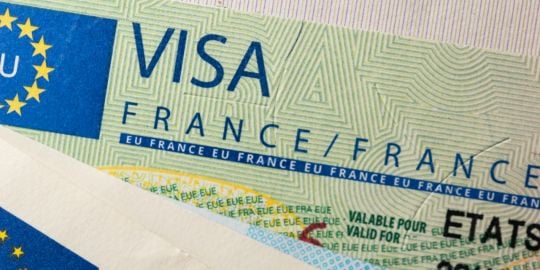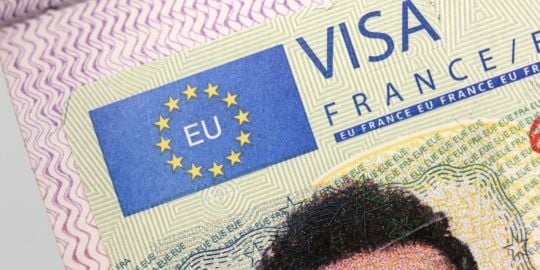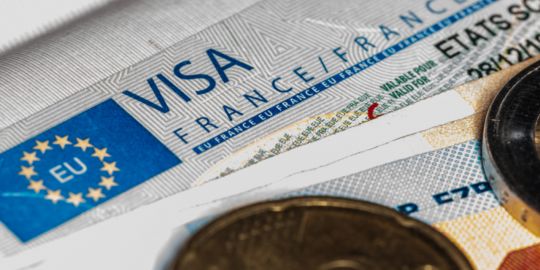Advice on the French Working Holiday Visa for New Zealanders

France can certainly be considered the pearl of Europe with its rich centuries-long history, fabulous and exquisite cuisine known worldwide, world-class art, artists and museums, and vast and peaceful countryside, its modern and trendy urban areas, etc. Yes, there must be a thousand and one reasons why New Zealanders are enamored with France.
The good news for them is that thanks to an agreement between New Zealand and France signed in June 1999 and which came into force in April 2000, they will be able to take advantage of extended holidays in France to discover a maximum of places and things, and this, with the possibility of working to finance their stay.
Indeed, many young New Zealanders are looking for work experience abroad. If you are one of those striving to find a job in France, the French Working Holiday Visa allows you to work in France for up to a year.
In this article, we will outline all the information you need to apply for a Working Holiday Visa in France.
Important:
Please note that the information in this article is for New Zealand citizens only.
What are the eligibility conditions for the Working Holiday Visa in France?
To be eligible for the WHV program in France, you need to comply with the following conditions:
1. Your nationality and passport
To be eligible for the WHV in France, New Zealand participants (New Zealand citizens, to be precise) must hold a New Zealand passport and be resident in New Zealand at the time of application. It is essential that the passport is valid for a minimum of 12 months after arrival in France — at least until it is time for you to leave France.
Also, as with any trip you make outside New Zealand, it is important that your passport contains a few blank pages — at least two blank pages — so that the French customs authorities can stamp it when you enter and leave the country, but also so that your new visa can be affixed to it.
Good to know:
Once you receive your working holiday visa from the French embassy, we advise you to store it safely. Misplacing it could cause you a lot of inconveniences as it would be very difficult to reapply for it.
2. Your age
The working holiday program between France and New Zealand is only open to young New Zealanders who are at least 18 and not more than 30 years old! They can therefore apply for a WHV until they turn 31.
3. Having sufficient savings / a mandatory budget
As with any other WHV agreement in the world, or simply as with any international trip you will make in your life, having some money aside is fundamental. But for the WHV in France, having savings is a mandatory prerequisite for being given the green light for the visa.
You will need to prove that you have the financial means to support yourself when you arrive, at least until you find a job there. To do this, you will need to include an official bank statement signed by your bank as part of the documents you present when applying for the permit. You will need to have at least NZD 4,104.80, equivalent to €2,500, to cover your needs during your stay.
4. Having a medical insurance policy
As with savings, having a health insurance policy is also a requirement for the visa. Because illnesses and accidents are often unexpected and the hospital rates for foreigners in France are likely to be quite different from what you would have had to pay in New Zealand, the thing to do is to be prepared for all cases of illness, hospitalization, repatriation, disability and even maternity for you ladies.
So get yourself a good insurance policy that will cover you for the duration of your stay in France, and don't forget to provide proof of your insurance cover when you apply.
5. Having a clean criminal record
To be granted access to this visa, you will need to provide the French authorities with a clean criminal record. This means that you will need to apply to the New Zealand authorities for your record, which must show that you have not committed any crimes.
6. The number of entries
To be allowed to go on a WHV in France, one of the conditions is that you must never have participated in this program before. Indeed, the WHV visa is only granted once per participant. However, if you have already participated in a WHV program in Japan, Canada, Australia, Argentina, or elsewhere, this will not be a problem.
7. The quota
When a working holiday agreement is signed between two countries, one of the conditions of the agreement concerns the quota of participants who enter the host country. This is a measure that helps the receiving country control the number of visas granted per year and, therefore, the number of people who arrive on their territory each year on that visa.
In the case of the agreement between New Zealand and France, however, no annual quota has been defined. This means that New Zealanders can apply for a WHV throughout the year without fear of rejection due to a lack of places.
8. Duration of validity
Your WHV France is valid for 12 months and can be obtained up to 6 months before arrival in France. However, it cannot be extended.
Good to know:
You are allowed to enter mainland France but not necessarily the French overseas territories.
9. Purchasing airline tickets
To travel to France, you will, of course, need to buy return air tickets to show when applying for your WHV at the French Embassy in Wellington.
You may not yet know what date you want to return to New Zealand and decide to buy your single ticket for the time being — this is possible, but only if you can provide proof that you will have the financial means to return to New Zealand.
If you decide not to buy a return ticket right away (perhaps because you don't yet know the date you plan to return to New Zealand), you will need to prove that you have the money to buy one later.
Good to know:
The mandatory savings mentioned above do not count as proof in this case. You will have to prove that you have enough money for the return ticket apart from these savings.
10. Not being accompanied
To benefit from the WHV in France, you cannot be accompanied by any dependents. This means that when you are granted a visa, it will only apply to you and no one else.
However, if you wish to travel with two or more people, they will have to apply for a visa separately and will, of course, have to be eligible under the above-mentioned conditions.
What are the procedures for New Zealanders to apply for a Working Holiday Visa in France?
You must submit your application for a Working Holiday Visa for France to the French Embassy in Wellington, New Zealand. It is mandatory to make an appointment via the online registration system.
You must provide the following documents:
- your completed and signed visa application form;
- the English and French versions of the completed and signed agreement form;
- your New Zealand passport, which must remain valid for three months after the visa expiry date;
- a recent passport-size photograph;
- proof of financial resources or proof of sufficient funds (recent bank statement);
- a cover letter in English and French describing the reason for your application;
- proof of residence in New Zealand;
- one year's health insurance covering you from the date of your arrival in France;
- proof of your travel itinerary; and
- 99 (approximately NZD 162.5) which must be paid in cash.
Your working holiday visa should be delivered to you on the day of your appointment at the French Embassy in Wellington.
Important:
All appointments must be made at least three months before the date of departure for France.
You will then need to apply for a temporary work permit with the local employment office. The temporary permit can be renewed, but only up to the authorized duration of stay in France, i.e., 12 months.
Useful addresses:
Embassy of France in Wellington
Physical address:
Levels 12 and 13
Sovereign House
34-42 Manners Street
Wellington 6142
New Zealand
Postal address:
PO Box 11-343
Wellington
New Zealand
Things to consider before moving to France on a WHV
Going to a country without a minimum of preparation is not advisable. Here are the things you should consider before packing your bags:
1. The cost of living in France
Before traveling to France, it is recommended that you have an idea of the cost of living in order to prepare your budget.
Here is a table that will give you an idea of the cost of living in France - (source Numbeo; as of July 2022):
|
Currency: New Zealand dollars (NZD) |
|
|
Rent |
|
|
1-bedroom flat (in the city center) |
1 255,99 |
|
1-bedroom flat (outside the city center) |
987,44 |
|
3-bedroom flat (city center) |
2 653,50 |
|
3-bedroom flat (outside the city center) |
1 857,50 |
|
Utilities |
|
|
Water, electricity, air conditioning, heating, waste collection for an 85m²apartment |
249,99 |
|
Internet (60 Mbps or more, ADSL/cable, unlimited data) |
47,67 |
|
Transportation |
|
|
1 ticket (one way) for local transport |
2,62 |
|
Monthly pass for local transport |
106,40 |
|
Shopping/groceries |
|
|
Rice (1 kg) |
3,11 |
|
Milk (1 L) |
1,66 |
|
12 eggs (normal size) |
5,09 |
|
Bread (500 g) |
2,49 |
|
Chicken (1 kg) |
16,90 |
|
Red meat (1 kg) |
29,58 |
|
Oranges (1 kg) |
4,08 |
|
Bananas (1 kg) |
3,15 |
|
Apples (1 kg) |
4,29 |
|
Potatoes (1 kg) |
2,90 |
|
Onions (1 kg) |
3,25 |
|
Water (1.5 L) |
1,16 |
|
Wine (mid-range bottle) |
11,46 |
|
Local beer (0.5 L) |
3,39 |
|
Imported beer (0.33 L) |
3,91 |
|
Cigarettes (pack of 20) |
16,37 |
|
Leisure |
|
|
Movie theatre - 1 seat |
16,37 |
|
Sports club - monthly cost for 1 person |
54,51 |
2. Looking for accommodation in France
If there is one thing you are advised to start with, it would definitely be finding accommodation in France. There is nothing more stressful than traveling to a country and not knowing where you are going to sleep the night you arrive. So take the lead and look for a safe place to stay that fits your budget. Google is your best friend! Begin your online search by using keywords related to the type of accommodation you would like to have in the area you wish to visit – for instance; "short-term room to rent", "cheap", "low budget", "Vaucluse", "Avignon", "France".
Don't hesitate to use specialized platforms such as Airbnb, which is also a very secure website that allows you to see the comments of previous tenants! Those looking for very affordable temporary accommodation in France should consider Couchsurfing (couchsurfing.com, hifrance.org, Pret-a-voyager.com) or youth hostels (aubergesdejeunesse.com, French.hostelworld.com).
Good to know:
Once you've found the accommodation you plan to rent, why not take a look at Tripadvisor to see what they have to say about these places? This will give you peace of mind!
3. Looking for work in France
What do you want to do for work during your WHV in France? If you already know, take a look at Pôle Emploi, Indeed France, France-emploi, Monster or Keljob, which are platforms that could help you get in touch with employers looking for someone with your skills.
If your heart is still in the right place, why not consider Wwoofing, which offers you the chance to discover the world of organic farms in exchange for a small salary, a place to sleep and food. Also, consider giving English lessons - many French people are looking for a private tutor to help them practice their written and/or spoken English; this will give you an income stream and maybe even some new friends.
Important:
Once you have found a job in France, a temporary work permit from the Employment Service (DIRECCTE - Regional Directorate for Business, Competition, Consumption, Labour and Employment) will be required.
4. Learn the French language
Learning French or at least a basic level of French is recommended for all New Zealanders who wish to travel to France. You will be able to communicate better and immerse yourself in the culture by having a knowledge of the language. Why not get started with fun applications such as Memrise, Babble, LinguaLift, Mondly, HelloTalk or Duolingo.
And don't miss out on the opportunity to practice your French during your stay!
Useful link:









